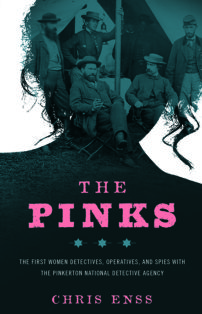Enter for a chance to win a copy of
The Pinks:
The First Women Detectives, Operatives, and Spies with the Pinkerton National Detective Agency

Elizabeth Baker sat at a small, burl walnut desk, frantically scribbling on thick sheets of paper. A silhouette of her image cast on the fabric covered walls showed her flipping through the sheets paper. She was inspecting a variety of crude drawings of ships. The flame from a lit candle on the desk next to her danced in harmony with a draft seeping in through a closed window. It was early fall in 1861 in Richmond, Virginia. The Civil War was in its infancy, and military leaders from the North and South had sent spies behind enemy lines to learn whatever secrets they could.
Allan Pinkerton directed Mrs. Elizabeth H. Baker to go to the Confederate capital to acquire information about the Rebel navy. She didn’t hesitate to abide by the detective’s orders. Elizabeth had been working as an operative for the Pinkerton Detective Agency for a number of years. Although assigned to the Chicago office, she had traveled out of town on occasion, teaming with other agents to investigate robberies and missing person cases. Prior to moving to the Midwest, she had lived in Virginia and was well acquainted with the customs and the people of the region. When war broke out she relocated. Pinkerton referred to her as a “genteel woman agent” and considered her “a more than suitable” candidate for the assignment he’d selected for her.
Elizabeth wrote two sets of friends she had known from her days living in Richmond and informed them of her plans to visit. Claiming to miss being in Virginia, she told them she wanted to return and stay for a long visit. As luck would have it, Captain Atwater of the Confederate Navy and his wife invited Elizabeth to stay with them when she came to Richmond.
Elizabeth arrived at the Atwater’s home on September 24, 1861. The reunion was a happy one, and the three friends attended numerous receptions, balls, and fund-raisers together. Elizabeth met influential socialites, Confederate officers, and politically ambitious Southerners who claimed to possess the precise plans needed to defeat the North.
Drinks flowed at many of the soirees the Atwaters and Elizabeth were invited to attend. Tongues loosened at the events as the champagne and bourbon were consumed. One evening after having too much to drink, Elizabeth’s host decided to discuss the issues between the states and speculated on the tactics the Confederate navy would use to ensure the South would win the war. Elizabeth played her part well, agreeing with Captain Atwater about the North’s weaknesses and how much better life would be when the South defeated the Yankees.
When the three friends were not attending grand, social functions, they were touring the city. Elizabeth made mental note of the number of Confederate forces amassing in Richmond, the artillery being transported in and out of the city, and the fortifications being built around it. In the evenings before retiring to bed, Elizabeth jotted down everything she had seen and sketched the vital information on scraps of paper. She hid the notes and sketches in the crown of her bonnet.

To learn more about Elizabeth Baker & Mary Touvestre, the cases they worked, and the otherwomen Pinkerton agents read
The Pinks:
The First Women Detectives, Operatives, and Spies with the Pinkerton National Detective Agency

